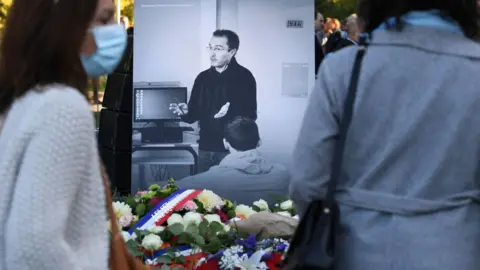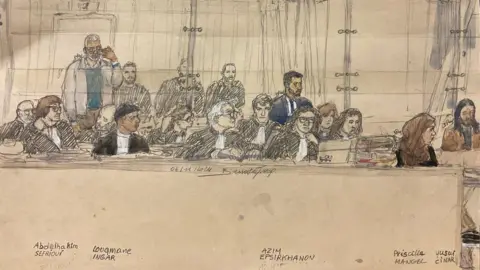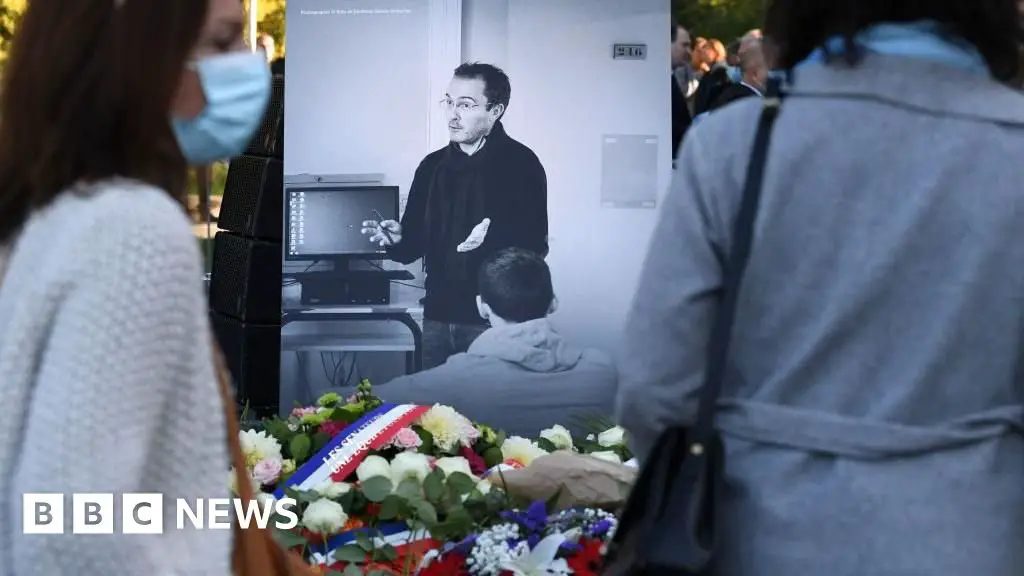 AFP
AFPEight people accused of complicity in the jihadist murder of French teacher Samuel Paty are to learn their fate after a six-week trial in a Paris court.
This includes the father of a student whose lie about Paty’s alleged discrimination against Muslims in the classroom set in motion the events that led to his beheading on a street in October 2020.
Also on trial are a Muslim activist who led an online campaign against Paty, two childhood friends of Chechnya-born killer Abdoullakh Anzorov who allegedly helped him acquire weapons, and four radicalized men with whom he messaged on social media exchanged.
Anzorov was shot dead by police minutes after the 47-year-old history and geography teacher was murdered outside his secondary school in the Paris suburb of Conflans-Saint-Honorine.
It was fueled by claims circulating online that Paty had ordered Muslims to leave his class of 13-year-olds a few days earlier before revealing obscene images of the Prophet Mohammed.
In fact, Paty had been teaching a lesson on freedom of expression and before showing one of the controversial images first published by Charlie Hebdo magazine, he advised students to look away if they feared being offended.
The student, named Z. Chnina, had not even been in class at the time, but told her father that she had been punished for raising an objection.
The trial centered on legal disputes over whether people who had no prior knowledge of the attack – or in some cases even of its perpetrators – could still be guilty of a “terrorist organization” based on their words.
In summary, prosecutors in court this week called for prison sentences ranging from 18 months suspended to 16 years for the defendants, saying their actions indirectly led to the atrocity.
However, prosecutors had also angered members of Paty’s family by refusing to push for maximum sentences and by downgrading the classification of some of the crimes charged.
 Getty Images
Getty ImagesDuring the trial, the court heard the first public testimony of the now 17-year-old girl Z. Chnina.
A year ago, she was sentenced by a juvenile court to a short suspended sentence for defamation, the hearings of which took place behind closed doors.
“I want to apologize to the whole (Paty) family because without my lies they wouldn’t be here today,” she said, sobbing.
“And I want to apologize to my father because when he made the video, it was partly because of me lying.”
In the days following Paty’s free speech class, her father, Brahim Chnina, made videos in which he called the teacher names. He also enlisted the help of activist Abdelhakim Sefrioui to spread the campaign through his social network.
Chnina and Sefrioui never demanded action against Paty, and they were unaware of Anzorov’s existence until the murder took place.
However, for the prosecution, they were guilty of being a “terrorist organization” because they were aware of the possible consequences of their election campaign.
“No one says they wanted Samuel Paty dead, but when they lit 1,000 digital fuses, they knew that one of them would lead to jihadist violence against the teacher,” the prosecutor’s statement said.
The context in October 2020 was one of heightened tensions over jihadist violence after Charlie Hebdo republished some of the controversial Mohammed cartoons. Five years earlier, most of the magazine’s employees were murdered in a jihadist gun attack in their Paris office.
This week, the longest prison sentences were sought in court for Anzorov’s two friends who accompanied him to buy a knife and a fake gun. One of them also drove Anzorov to school on the afternoon of the attack.
None of these defendants are radicalized Muslims, and it has not been proven in court that they knew about Anzorov’s plans.
Because of this, prosecutors downgraded the charge against her from “complicity in a terrorist attack,” which carries a possible life sentence.
The four other defendants are people with whom Anzorov chatted on chat lines without ever revealing his intention to kill Paty.
One of them, an Islamic convert Priscilla Mangel, admitted to making “provocative” comments online about the Paty case, but said she would never have made them if she had known Anzorov’s intentions.
“For me it was a harmless discussion with an anonymous person.”
According to defense attorneys, none of the defendants would have been prosecuted for their statements had it not been for Paty’s murder.
The key legal question facing the court is therefore whether statements can become unlawful depending on what follows.






